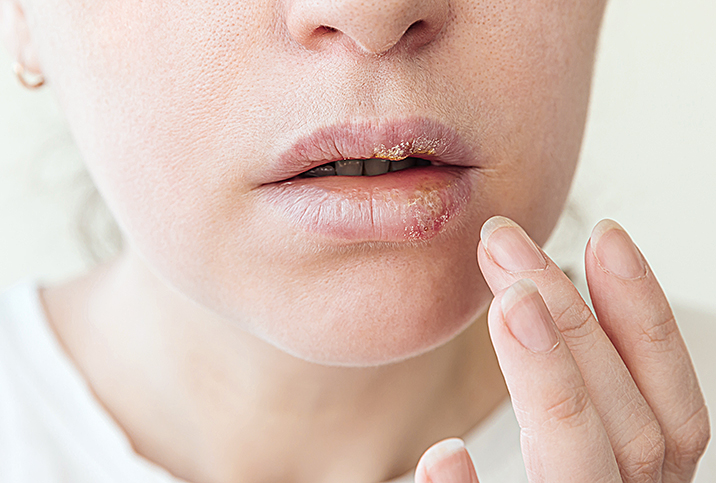Herpes: Symptoms, Diagnosis and Treatments

It's estimated that 50 percent to 80 percent of U.S. adults have oral herpes, and according to the National Institutes of Health (NIH), as many as 90 percent of Americans will be exposed to the virus by age 50.
There is no cure for the herpes simplex virus (HSV), and most people rarely show symptoms. In order to enjoy sex while living with herpes, be open with your partner, use condoms, take antiviral medication and avoid sexual contact during an active outbreak.
Herpes is a sexually transmitted or orally transmitted virus with two types: HSV-1 and HSV-2. HSV-1 is more commonly known as oral herpes and can lead to HSV-2, known as genital herpes. But there are misconceptions about the virus and, as a result, shame associated with having it, especially for people who show visible sores.
Let's take a closer look at the symptoms of HSV, how the condition is diagnosed and the treatments that can offer relief.
Signs and symptoms
"The common symptoms of herpes are typically flu-like symptoms," said Monty Swarup, M.D., FACOG, board-certified in OB/GYN in Chandler, Arizona and the founder of HPD Rx. "You may get sores that are small and may appear as fluid-filled blisters. The sores tend to cluster and the area will be tender and swollen. If they appear on the genitals, a burning sensation may occur when urinating."
People infected with oral herpes may experience burning, tingling or itching in the mouth area before sores break out either externally (on the lips) or internally (inside the cheeks and gums).
Once the sores break out, it can take more than a week for the skin to heal, according to the Centers for Disease Control and Prevention (CDC). There may be odorous genital discharge or bleeding in between periods for people who menstruate.
When symptoms of herpes arise, it's important to seek treatment with your general doctor or gynecologist to get on a treatment regimen to prevent passing the infection to sexual partners. The CDC recommends a daily anti-herpes medication to decrease the chance of spreading the virus.
Many ailments, including COVID-19, come with "flu-like" symptoms, so those symptoms on their own are not enough to cause concern about herpes. However, if you've been in a situation where you think it's likely you contracted herpes or you want to play it safe, seek medical attention.
"If you have been in sexual contact with someone who has herpes, talk with your doctor," Swarup said. "If you have symptoms such as sores and blisters, you should make an appointment to see your doctor."
Tests, diagnosis and treatments
"A common misconception is that an antibody blood test positive for HSV suggests you have HSV," Swarup said. "This is not true. HSV is diagnosed with a culture or other biochemical test from an actual lesion itself that is positive. A positive antibody test is suggestive of exposure to HSV but not necessarily that the virus is sitting dormant in the patient's nerve roots. Also, a blood test will not reveal how long ago you were exposed."
If there is an active outbreak, especially in the genital region, a doctor may diagnose herpes by looking at the affected area. Then a sample from the sore is taken to confirm the diagnosis, and the doctor may test for other sexually transmitted infections (STIs). At this stage, it's crucial to be honest with your doctor about recent sexual experiences and every symptom you're experiencing, as herpes can exist alongside other STIs and you want to make sure you get treated for everything you might have.
"The best treatment for herpes is antiviral medicine to shorten or prevent outbreaks," Swarup explained. "Antiviral medicine also reduces the chance of spreading HSV, however, there is no cure for herpes."
If herpes goes undiagnosed and untreated, it can become painful with sensitive sores, especially in people with compromised immune systems, he added. Touching fluid from your sores can transfer to other parts of your body, such as your eyes, and the longer your herpes goes untreated, the more likely it is you will spread it to other areas of your own body, as well as to other people.
However, for some people, since they present no symptoms or outbreaks, having herpes will not cause alarm. Untreated herpes is much more easily transmissible than treated herpes since one of the main benefits of the antiviral medication is to lessen the ability for the virus to be passed on to someone else.
There is evidence of untreated herpes resulting in symptoms similar to those of untreated syphilis, such as dementia, hearing loss, meningitis, vision issues and stroke.
For pregnant people, it's imperative to seek medical attention at the first sight or suspicion of herpes, as untreated herpes may cause a miscarriage or premature labor and delivery, according to the CDC. You could also pass herpes to your unborn child before birth or during delivery. Antiviral medication for herpes can prevent early labor and decrease the chance of spreading the virus to your baby.
Herpes: 4 common misconceptions
The following are common misconceptions about the herpes simplex virus:
1. You need to have sores to pass HSV to someone else
In fact, both HSV-1 and HSV-2 can spread with or without lesions. This makes herpes very dangerous because you could be spreading it without even knowing you have it. If you have herpes but don't have a current outbreak, inform your sexual partners and use condoms during sexual activity.
Testing for herpes antibodies isn't recommended for people without symptoms, even though most people with herpes don't show symptoms. There is too much room for error with testing for herpes antibodies without symptoms. However, if you're sexually active, stay vigilant and talk to your healthcare provider about any fears or concerns regarding possible herpes infections.
2. HSV-1 affects only your mouth
HSV-1 is commonly known as oral herpes. However, if someone infected with HSV-1 performs oral sex on another person, their partner can develop HSV-1 on their genitals. Similarly, if someone with HSV-2, commonly known as genital herpes, receives oral sex, the one giving oral sex can contract HSV-2 in or around their mouth area.
Herpes can affect your eyes if you touch fluid from an active herpes outbreak, but the body produces antibodies to prevent herpes from spreading to other areas such as your arms, legs and hands, according to Johns Hopkins Medicine.
3. Herpes is curable
Unfortunately, there is no current cure or vaccine for herpes. However, there is much research being done to find a cure, and some research is heading into the clinical trial stage. As with cancer, it is hard to pin down herpes' root cause, which makes it difficult to create vaccines and cures.
There are currently two vaccine options in development, according to the World Health Organization, one for HSV-1 and one for HSV-2. But this isn't the first time, and probably not the last, that vaccines for herpes have been in the works. Herpes vaccine trials have been around since the 1930s, but despite this long history, none have reached the marketplace.
As for the elusive cure, there is an injection being studied by the Fred Hutchinson Cancer Center in the United States, and researchers at the KTH Royal Institute of Technology in Stockholm are working with cow mucus to find a cure.
4. There is only one type of herpes
There is HSV-1 and HSV-2, and while both are varieties of the herpes simplex virus, there are differences in transmission. HSV-2 typically is a sexually transmitted infection, while HSV-1 typically spreads by oral transmission. However, as mentioned above, HSV-1 can be contracted on your genitals by receiving oral sex from someone infected with HSV-1, and HSV-2 is transmittable to the mouth.
Another infection associated with herpes is herpes zoster, the shingles virus. This virus causes chickenpox early in life and can become latent in the body and present later as shingles as the virus exits the nerve roots. However, chickenpox and shingles aren't conditions caused by the herpes simplex virus.
Editor's note: This report is part 2 of a four-piece introduction and continuing update focusing on the herpes simplex virus. Check out the other parts of this series:
- Herpes Simplex Is More Complex Than You Might Think
- Herpes: Symptoms, Diagnosis and Treatments
- Herpes: Complications, Costs and Your Reproductive Health
- Herpes: Living, Dating and Thriving


















